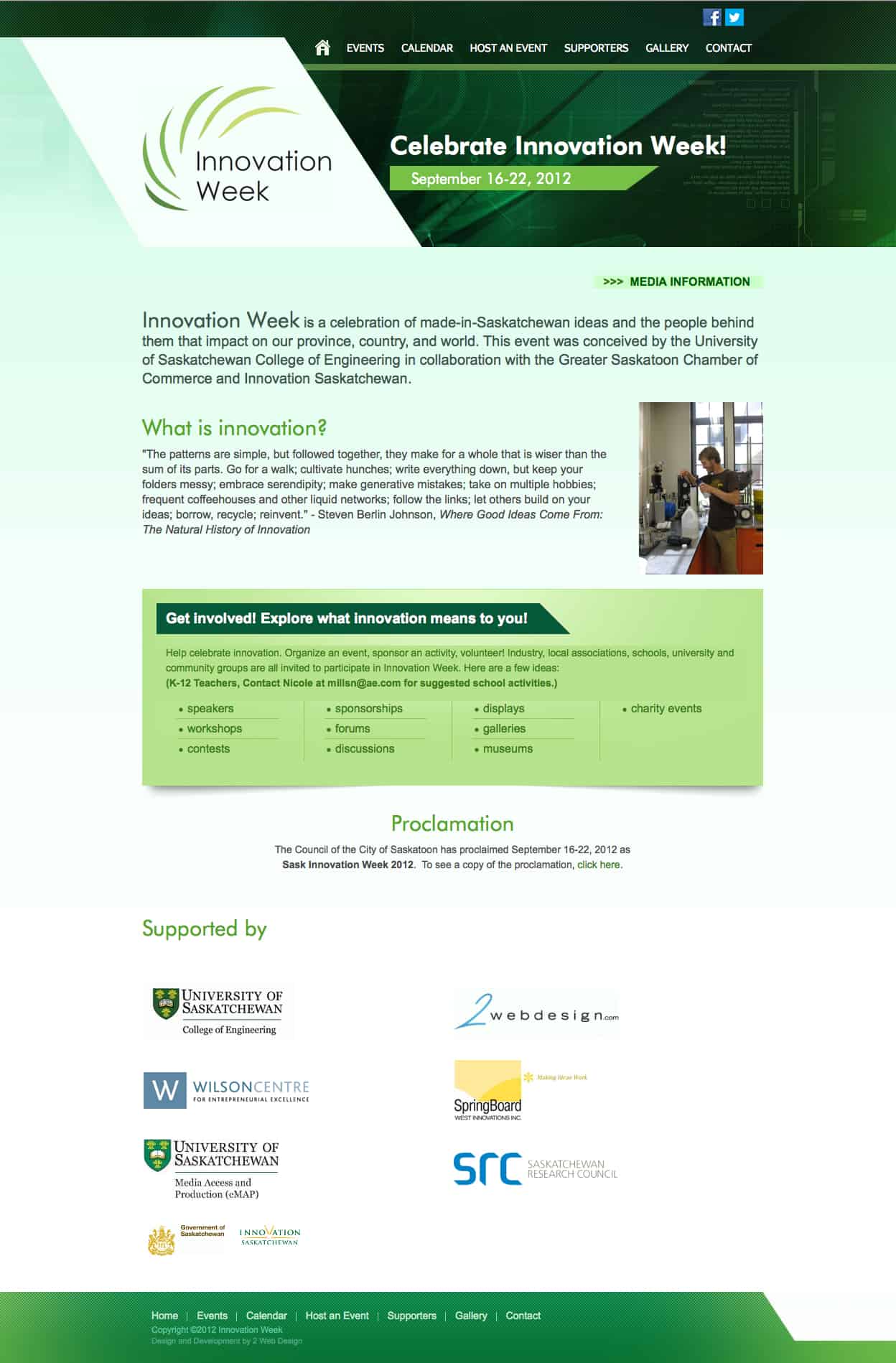September 16, 2012 sees the start of Innovation Week. A weeklong celebration dedicated to made-in-Saskatchewan ideas; the people behind them; and the impact on the province, the country, and the world. But what is innovation, and more importantly, what with the Apple vs. Samsung battle finally drawing to a close, is innovation at a standstill? To some that second question might seem like a daft thing to ask—it probably sounds more like a Karl Pilkington statement—but surely innovation isn’t as innovative as it once was, is it?
Before I get any deeper into this, and by that I mean asking more questions; let’s at least answer the first question. So what is innovation?
According to my online source—that’ll be Google—innovation is defined as,
- The action or process of innovating;
- A new method, idea, product, etc.
So, there you go. On paper innovation is easy to describe, almost simple. However, to actually be innovative takes something more. I could now quite easily list a bucket load of innovators and why they are credited with providing innovation to a) the human race and b) society, but you could also quite easily just Wikipedia or Google it. So instead on to my next, and the most important, question…
Is innovation at a standstill?
Yes or No?
It would easy to just state either yes or no to that. Then this case would be closed. But what’s the point in that? Let me have my 10 minutes and see where I’m going with this…
Apple’s victory over Samsung—yes I’m going to using this case as my example—I’m sure I’m not the only one who has been fascinated by it. Quite honestly I really thought Samsung would win or that it would just get “thrown out” of court, but when billions are at stake surely it’s more a question of how much this victory is worth to the victor, rather than who copied who, no?
In 2007 Apple decided to not place a physical keyboard on it’s smartphone. Radical? Yes. Ludicrous? Back then, most definitely. But if you look at all the devices from 5 years ago they all have a clunky appearance, except the design that changed it all: Apple’s. So clearly that designed worked, hence why the market was flooded with similar designs, even Nokia. (Ahhhh, poor Nokia).
Now my understanding of the Apple/Samsung case was not about the design, nor the computer hardware, but instead the experience the user gets when interacting with the device.
Look at web design for example—I should probably use this segue to mention that the Sask Innovation Week website was designed and developed by…yep! You guessed that right, us!—and how much that has changed in the past 20 or so years.
As we know design, fashion, technology is moving rapidly. That fact isn’t surprising or new to me, you, or anyone. But what matters, and this is why Apple was so aggrieved by Samsung, is the innovated technology that comes packaged within that device. The design itself isn’t necessarily the innovation (sorry designers), but the combination of blistering pace with brutally Darwinian levels of competition exerts a considerable pressure towards its inverse: homogenization.
Innovation in today’s market
Launching any form of serious digital device today encompasses a lot of time and money. Hundreds of hours of user testing; minute observations of everything from eye movement to depth of engagement; and analyzing navigation are just a few of the factors needed. However, on top of that, the device still needs to look and feel the same as its competitors.
It could have the best user interface with the greatest of all navigation, but if it looks like the arse end of a rhino and is the size of a classroom whiteboard it’s not going to sell (I’m still unsure about the appeal of the phablet). But that’s where companies find themselves: stuck between a rock and a hard place.
As any technology business owner would tell you, being original is awesome, but at the same time it’s a costly gamble. Whereas imitation means joining the back of a very long queue, or as in Samsung’s case, (allegedly – best throw that in there!) borrowing Apple’s formula a little too closely.
So is innovation at a standstill?
Maybe standstill isn’t the correct term to use, although I don’t think it’s an inappropriate term to use, because innovation does encompass a wide variety of markets, technologies, and groups, and who knows maybe there is a market that has been at a standstill for years? However, in regards to the mobile device/smartphone market, unless someone out there is willing to take that gamble, that risk, and change what is now our expectations of how these devices should look and feel, I can’t see anything innovative in this field for a long time.
What’s your opinion? Do you agree that innovation is really at a standstill? Leave your comments below.




Excellent, what a web site it is! This webpage provides helpful information to us, keep it up.
Generally I don’t read post on blogs, however I would like to say that this write-up very forced me to try and do it! Your writing taste has been amazed me. Thanks, very great post.|
Ahaa, its good conversation on the topic of this paragraph here at this webpage, I have read all that, so at this time me also commenting at this place.
Thanks for one’s marvelous posting! I genuinely enjoyed reading it, you’re a great author.I will be sure to bookmark your blog and definitely will come back later in life. I want to encourage you to continue your great work, have a nice morning!
Great article.
An outstanding share! I’ve just forwarded this onto a co-worker who had been conducting a little homework on this. And he actually ordered me dinner because I found it for him… lol. So allow me to reword this…. Thanks for the meal!! But yeah, thanx for spending time to discuss this topic here on your web site.
I blog often and I genuinely appreciate your information. This article has truly peaked my interest. I am going to bookmark your site and keep checking for new details about once per week. I subscribed to your Feed too.
Great article, just what I was looking for.
I am now not certain the place you’re getting your info, however great topic. I needs to spend some time learning more or understanding more. Thanks for fantastic information I used to be looking for this info for my mission.
That is a great tip particularly to those fresh to the blogosphere. Brief but very precise information… Thank you for sharing this one. A must read article!
May I simply say what a comfort to find somebody that really understands what they’re discussing on the internet. You actually realize how to bring a problem to light and make it important. A lot more people should read this and understand this side of the story. I was surprised that you’re not more popular given that you definitely possess the gift.
I’ve been browsing online more than 2 hours today, yet I never found any interesting article like yours. It’s pretty worth enough for me. In my opinion, if all web owners and bloggers made good content as you did, the internet will be a lot more useful than ever before.
Generally I don’t learn post on blogs, but I would like to say that this write-up very forced me to take a look at and do it! Your writing taste has been surprised me. Thanks, quite nice post.|